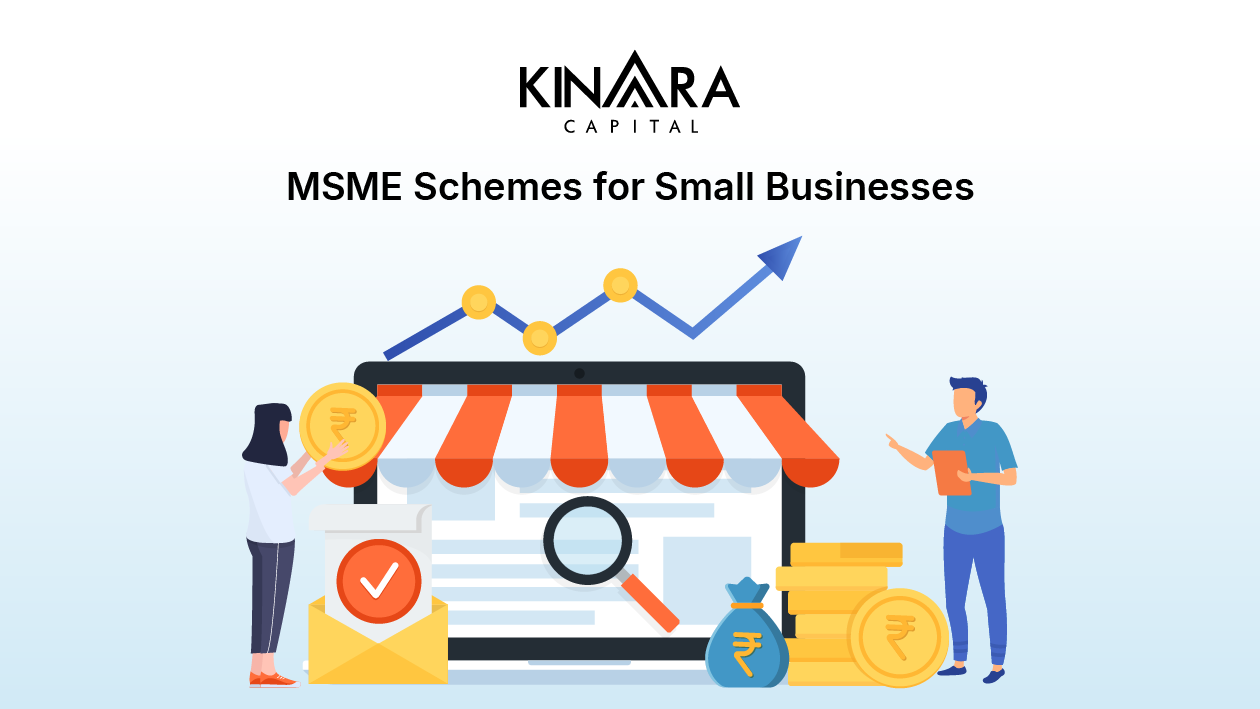
Micro, small, and medium enterprises (MSMEs) play a critical role in the socio-economic progress of the nation. However, these businesses are often faced with various hurdles in terms of operating smoothly because of their size and limited access to resources. This is where MSME schemes come in. There are various government schemes for MSMEs, which are designed to give them a leg up, so that they can overcome the issues that hold them back.
The Ministry of MSME implements various programs and MSME schemes to develop and promote MSMEs across the country. The Government of India has been extremely proactive in ensuring that all of the benefits of these MSME schemes reach the respective parties.
However, it’s a known fact that government MSME schemes usually take a long time to process and might be difficult to qualify for. However, there’s no reason to worry as MSMEs have access to several other options today.
The government has launched several MSME schemes to help boost the sector’s growth and ease operations for MSMEs. Here’s a look at 4 MSME schemes that are particularly beneficial:
The aim of various government schemes for MSMEs is to ease access and viability for MSMEs, so that they can become more competitive and operationally efficient. The benefits of MSME schemes are extensive, if these businesses are able to tap into them. They can help MSMEs access financing to upgrade machinery and infrastructure, as well as generate more income and create jobs in local economies. However, there is an awareness gap when it comes to government schemes for MSMEs, which keeps these businesses from accessing and utilizing the benefits of these programs in a comprehensive way. There is a need for a stronger push for awareness and visibility so that MSME entrepreneurs can easily make the most of the subsidies and benefits the government offers.
You can avail of collateral-free business loans from Rs. 1 lakh to Rs. 30 lakhs. Unlike with other financial institutions or banks, you can borrow money from us without the need for security or collateral.
At Kinara Capital, you can avail of business loans in a timeframe as short as 24 hours. The whole process can be completed online, so you can meet your immediate fund requirements without waiting. Begin with our 1-minute online eligibility check and take the application process forward by entering your details and uploading the necessary documents. Alternatively, our loan officer will contact you to guide you through the process.
We require minimum and basic documentation from the borrower’s end. Since everything can be carried out online, you can easily upload your personal and business documents from the comfort of your home.
NBFCs are more proactive in innovating financial products than banks because they are more flexible in terms of lending. This allows MSMEs to facilitate their growth and expansion in an extremely prudent manner. They fine-tune their loan products based on their target customers.
At Kinara Capital, we offer credit options, including working capital loans, asset purchase loans, and HerVikas loans (tailor-made especially for women-owned businesses). So, choose Kinara Capital and kick-start your growth journey today.
The 64 million MSMEs in the country are considered the backbone of the economy. However, they often face hurdles when it comes to accessing financing because they are considered high-risk by traditional lenders like banks. This keeps them outside the ambit of financial inclusion and limits their ability to grow and achieve their true potential. The Indian government is well aware of this issue, and over time, has launched a number of beneficial schemes to bridge the gap and help MSMEs access the capital they need. These are aimed at lowering credit risk associated with MSMEs, as well as easing the burden on them through subsidies. If MSMEs are able to properly make use of these schemes, they can scale new heights. However, there is still a gap in awareness about these schemes and how to access them, so many MSMEs lose out on these benefits. There is a need for more awareness, so that these businesses can access the benefits allocated to them.
1. Are there any subsidies or financial assistance available under MSME schemes?
There are a number of government schemes that provide subsidies and financial assistance. In addition to the ones listed above, there are also the Micro & Small Enterprises Cluster Development Programme, National Manufacturing Competitiveness Programme, etc.
2. How can MSME schemes help in the growth and development of small businesses?
MSME schemes can ease access to necessary capital for MSMEs, so that they can pursue growth plans unhindered by the lack of access to financing.
3. Are there any specific eligibility criteria for small businesses to avail of MSME schemes?
Small businesses must fall under the MSME categorization established by the government in order to access MSME schemes.
4. Can small businesses avail of multiple MSME schemes simultaneously?
Yes, MSMEs can make use of more than one MSME scheme at the same time, provided they meet the eligibility criteria for each scheme
5. How can I stay updated about the latest MSME schemes and initiatives?
YOu can periodically check the official Ministry of MSME website or the SIDBI website. Both regularly update information on schemes, policies, and notifications.
6. Are there any specific MSME schemes for women entrepreneurs?
Yes, there are several, including the Mahila Udyam Nidhi Scheme, Udyogini Scheme, Annapurna Scheme, Stree Shakti Package for Women Entrepreneurs, Bharatiya Mahila Bank Business Loan, TREAD Scheme, and Mudra Yojana Scheme for Women.
7. Are there any specific MSME schemes for rural or tribal areas?
The government has instituted various MSME schemes specifically for rural and tribal areas. These include the Prime Minister’s Employment Generation Programme, Scheme of Fund for Regeneration of Traditional Industries, the National Rural Livelihood Mission, and Rural Self Employment Training Institutes.
